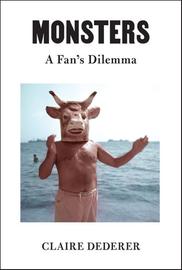
|
|
| (photo: Jenny Jimenez) | |
Claire Dederer began her writing career as Seattle Weekly's chief film critic. She's the author of two memoirs: the New York Times bestseller Poser: My Life in Twenty-Three Yoga Poses and Love and Trouble: A Midlife Reckoning. Dederer lives in Seattle on her late father's houseboat. Shelf Awareness spoke with her about her third book, Monsters: A Fan's Dilemma (Knopf, $28, reviewed in this issue), which grew out of her widely read 2017 Paris Review essay "What Do We Do with the Art of Monstrous Men?"
Did you have any inkling that "What Do We Do with the Art of Monstrous Men?" would catch fire as it did, and what most surprised you about the feedback you received?
I had no idea it would take off the way it did. Funnily enough, it was as a citizen that I found the response most gratifying. The essay was written as the first chapter of a projected book (the book that would become Monsters)--I'd been working on that opening chapter/essay for about a year. It looked as though I'd whipped it off as a response to the #MeToo conflagrations of October 2017, but I'd actually been interrogating the subject for a long time. Given how screwed up and reductive our political discourse was during this period (and remains), I was moved and encouraged that people were responding to a piece that was not a hot take, but a long-simmering consideration. It made me feel like the world was more interested in nuance than I'd suspected, and that gave me a feeling of hope.
On the other hand, I was shocked by how savage the Woody defenders could be! Those men's-rights-type people are out of their gourds. Yes, I realize I'm saying this in print. Bring it on, you maniacs.
 In Monsters you write (semiseriously), "I wished someone would invent an online calculator--the user would enter the name of an artist, whereupon the calculator would assess the heinousness of the crime versus the greatness of the art and spit out a verdict: you could or could not consume the work of this artist." What do you think would happen if the world somehow produced such a calculator?
In Monsters you write (semiseriously), "I wished someone would invent an online calculator--the user would enter the name of an artist, whereupon the calculator would assess the heinousness of the crime versus the greatness of the art and spit out a verdict: you could or could not consume the work of this artist." What do you think would happen if the world somehow produced such a calculator?
I guess people would figure out a way to bludgeon one another with it? Monsters is very much about recognizing that each person has their own inner landscape and history that will shape their response--so I guess we each need our own calculator. (And I believe we each already have one, if we just pay attention to what we're actually feeling.)
Monsters isn't issuing directives, but what would you say to someone who proposed taking a purely emotional approach to your book's central dilemma--something like "Reject the work of a monstrous man if it makes you feel uncomfortable, and enjoy it if it doesn't"?
One of the projects of the book is to reclaim the emotional response to the work. To acknowledge that we're all informed by emotion, as well as by our own biography, and by the forces of history--whether we're aware of all those influences or not. So I'd probably say "Good on ya" to this person, except that would be pretentious because I'm not Australian.
I know from Monsters that you're not a fan of the phrase "cancel culture," which you describe as "hopelessly non-useful, with its suggestion that the loss of status for the accused is somehow on a par with the suffering endured by the victim." Is there a better way to sum up the fairly recent phenomenon of condemning and then closing the door on public figures who are guilty of rotten behavior?
The problem with the phrase "cancel culture" has to do with the way it's been twisted, torqued, spindled, and mutilated after years of use. I think this topic is so hugely divisive and such a political football that any phraseology would ultimately become distorted. What I want is this: a phrase that wasn't so reflexively dismissive of a complex and difficult dynamic, and that doesn't inherently demean people who've shown courage in coming forward to tell their stories.
I'm glad you mention John Lennon in Monsters. I often think about how, if he had been canceled in his lifetime for hitting his first wife, which is of course appalling, he wouldn't have been able to go on and serve the feminist cause the way he did--by championing women's lib, by becoming the first celebrity househusband, and so on. Is this "big picture" view something that fans should keep in mind when considering writing off a monstrous man?
I truly don't know what anyone should do, but I find in my own experience that this kind of long-game perspective really can matter. It's part of the personal equation, along with my own emotions, my own history, my own sense of the crucialness of the work itself.
What role do you think a monstrous man's contrition plays in his possible redemption or image rehabilitation?
As a recovering alcoholic, I find myself aligned--happily or unhappily--with people who have hauled themselves into a position where they are seizing a second chance. Displays of contrition are sometimes facile or cynical, and they sometimes center the experience of the wrongdoer over the experience of their victim(s). But surely contrition is an essential human possibility. Knowing you've done wrong, wanting to do better--if we obliterate that possibility, we've surrendered the capacity to grow and the capacity for real empathy, all at once.
Did you have any trepidation about writing Monsters, given that it takes on tinderbox topics, and what do you predict the response to the book will be?
Let me tell you about my extensive recent experimentation with anxiety-management pharmaceuticals! Seriously, this has been a harrowing book to prepare for publication. I fully expect torch-bearing crowds to converge on my house from all sides.
There's a saying that fear wonderfully concentrates the mind, and that's been my experience. The intense anxiety about the explosiveness of the subject matter led me to poke and prod every utterance in the book to make sure it was what I really thought. This turned out to be a good thing, in terms of my confidence in what I'd written.
In the end, though, I had to try to forget all that and find a way to write without defensiveness. I took as my guiding light this quote from Melissa Febos: "You have to write for the reader of best faith, the reader who most needs your work, and you need to do your absolute best work for that reader." So I cast the bad faith reader out of my mind and pushed the book to be more vulnerable and more true. --Nell Beram

